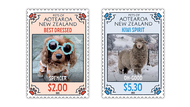Best in show
2nd Oct 2023
Companion animals - pets - are essential parts of life for the majority of New Zealanders. Each year, Companion Animals New Zealand (CANZ) releases a report on the companion animal population. CANZ promotes the practice of responsible companion animal guardianship.
According to the Companion Animals in New Zealand 2020 Report, there are more than 4.35 million companion animals in New Zealand - nearly equalling the population of humans.
Globally, it’s been estimated that more than 50 per cent of all people have at least one companion animal in their lives. When it comes to the proportion of households that give homes to companion animals, New Zealand is second only to the United States. It’s clear that Kiwis love their pets.
To celebrate the special relationships between humans and their companion animals, NZ Post asked for Kiwis to submit images of their pets for selection to star in our August stamp issue. The finalists were Spencer the dog (Best Dressed), Zita the cat (Cutest in Show), Kea the parrot (Cheekiest Rascal) and Oh-good the sheep (Kiwi Spirit).
Spencer
According to CANZ, as of 2020 34% of New Zealand households have at least one dog, up from 28% in 2015. This number may have increased since the pandemic, as people sought companionship in times of lockdowns and essential daily walks.
Cavalier King Charles Spaniel Spencer has impeccable fashion sense. He shares his house with Sadie Mae, another cavalier, cat tormentor Luna, and his human mum, dad and brothers. He is obsessed with water and prefers humans to other dogs.
Cavaliers were first introduced in the 1920s from a cross between King Charles and Cocker spaniels in an attempt to replicate the aesthetic of dogs seen in portraits from the era of England’s Charles II. Easy to train, they are known to be playful and gentle with people and other animals. Their regal origins reflect the care they need - they should be kept indoors and their long coats need to be brushed regularly. Despite being classified as a toy breed, they require plenty of play, exercise and training.
Zita
Three-year-old Seal Point Ragdoll Zita is cute and she knows it. She loves to patrol the neighbourhood and pose for Instagram.
CANZ reports that 74% of cat owners consider their feline companions to be part of the family. A Seal Ragdoll has a very dark brown color on its points - ears, nose, leg and tail. Its name is derived from the similarity of the brown in their fur to the colour of seals. They are known as Ragdolls because of their tendancy to go limp when picked up, which makes them extra cuddly. Ragdoll kittens are typically born white with mesmerising blue eyes.
Ragdolls are larger cats and will live for 15 years or longer. These friendly felines are sometimes described as being dog-like, as they love to play and chase, adore human attention and will even play fetch.
Kea
No, we have not mistaken this maroon-bellied conure for his native namesake! Kea likes to steal juice, climb up sleeves, and yell for attention before switching to an innocent chirp. These characteristics earned him the accolade of ‘cheekiest rascal’ in the Pets of Aotearoa New Zealand stamp competition.
Also known as the maroon-bellied parakeet, these beautiful birds make for friendly, affectionate companions who can be by your side for up to 30 years.
In the wild these birds are found in dense South American woodlands and wetlands, mainly residing in Uruguay, Brazil, Argentina, and Paraguay. They are more commonly found in the wild than as pets.
Oh-good
Can you think of a more Kiwi pet? Many New Zealanders who grew up rurally would befriended a companion sheep or lamb.
As grazers, sheep have different sorts of needs than the kinds of pets we might be used to. Sheep need access to food and clean water at all times. They require a spacious environment of pasture that is protected from predators and other dangers, with shade and shelter available. Sheep are social animals and like to have company. It’s ideal to keep a small group of sheep so they don't get lonely. They are intelligent and can be trained to respond to specific commands.
In this picture, Oh-good is around 18 months old. She likes to go wandering, and occasionally breaks into houses and sheds. She loves running along the fence line when she’s excited or sees her owner’s truck. Most of all, she loves food - especially Gingernuts.
